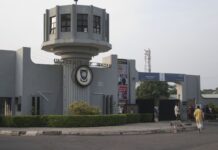As the federal government announces July 8, 11 and 15 as resumption dates of domestic flights, the managing director of Aero Contractors, Capt. Ado Sanusi has advised passengers who have malaria or common cold to stay away from the airline.
Sanusi who stated this today on Channels Television programme, Sunrise Daily, said the measure was taken to ensure its aircraft are safe.
“I will like to point out that if you have malaria or common cold, do not come to the airport because there is a high possibility that you are going to be denied boarding. This is the new normal that we are going to see. The main thing for the airlines is to make sure that the airplanes are safe and that is what we’re doing.”
He also said even with a doctor’s report that a passenger has malaria the airline would not accept it unless they come with a negative COVID-19 test result.
“My airline would not allow someone with a doctor’s report that says I have malaria. I would rather have him come with a COVID-19 test result certifying that he is free from COVID-19,” he said.
He added that passengers who sneeze and cough mid-air would be isolated on the aircraft and treated as suspected COVID-19 cases.
He said when the flight lands, such persons would be handed over to the port health authorities.
“If we see anybody sneezing, we will take him as an index passenger. We are not saying that he has allergies. We will take him as an index passenger till we have handed him over to the port health authorities and the trained personnel would be the ones to determine whether he is allergic or has COVID-19.
“If a passenger has allergies and starts sneezing, we will take him as an index passenger and there are protocols for that. We have made provisions for passengers to isolate and be taken care of,” he added.
On the two-metre spacing recommended by the World Health Organisation (WHO), the managing director said such directive would not be feasible on the aircraft but said passengers would be spaced where possible.
He added that as long as passengers wear face masks, then there should not be any problems.
He said there was no data to show that a fewer number of passengers would reduce the possibility of transmission
“The World Health Organisation has made it very clear that physical distancing should be two metres. We cannot achieve two metres inside a single-aisle airplane. The sitting is at most 55 inches.
“So, they said if you cannot achieve physical distancing, then you must wear your facial masks. What I want to point out is that the flying public should understand that we have gone through a three-layered approach to ensure that whenever they are seated in the aircraft they are very safe.
“We will try and spread as much as we can inside the airplane. As I said, we cannot achieve two-metre spacing between passengers bearing in mind that if a passenger tries to use the restroom, he will have to be close to another passenger.
“So, if there is a 60 per cent capacity, we will try and spread the passengers but that is not based on science but emotions and psychology of the passengers.”
With Punch report






















































